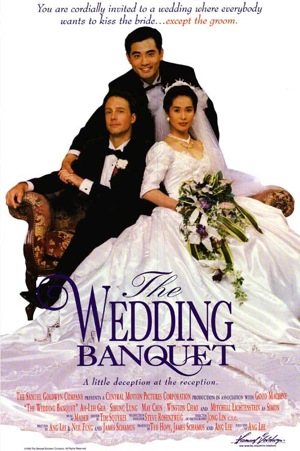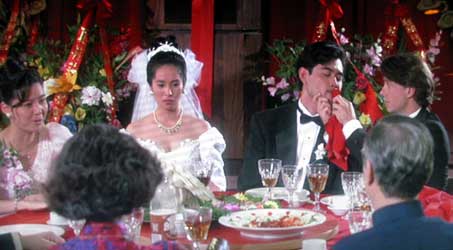 The Wedding Banquet
The Wedding Banquet
Directed by Ang Lee
Written by Ang Lee, Neil Peng, and James Schamus
Released August 4, 1993
Comedy (romance)
106 min. • Find on imdb
Review by Stephen O. Murray
August 8, 1993
I loved Ang Lee’s (1993) The Wedding Banquet. It seems Mitchell Lichtenstein flames in strong ensembles (every ten years, Streamers being the previous one).
The whole charade of the gay Chinese immigrant marrying a Chinese woman in need of a green card was Simon’s (Lichtenstein) idea and he initially thinks it cute to stage-manage his lover’s wedding. As Wai-Tung (Winston Chao) says of the wedding night, “Things got out of hand” (albeit first in hand…).
The main delight of the film is that Wai-Tung’s father, Gen. Gao (Lung Sihung, star of Ang Lee’s first feature, Pushing Hands) acknowledges that it is Simon who cares for his only son. The mother (Keui Ya-Lei)—to whom Wai-Tung comes out—does not seem to acknowledge his relationship to Simon. Wei-Wei (May Chin) does and tells him that he has to stay for the sake of the child. So Anglo boyfriend and father collude to keep the others from knowing that the father knows, while mother, son, and bride collude to keep a secret that isn’t one. A friend says that the father is allowing the son to keep face while the son is allowing the father to keep face.
Wedding Banquet resembled Pushing Hands in more ways than having the same visiting Chinese father. The Anglo daughter-in-law in Pushing Hands is far less accommodating than Simon is in The Wedding Banquet, but the Chinese son, who is caught in clashing cultural expectations and filial vs. uxorial demands in both, is frustrated, yuppie, and not given to displaying much emotion. I don’t think Winston Chao was wooden (and he was certainly very attractive), but acting out is alien to a Chinese son, even a pampered only son.
Hurt and anger are more visible from Mitchell Lichtenstein. (That his fury is about unsafe sex rather than jealousy is another brilliant touch.) In general he is a better Chinese wife that Wei-Wei, not only in terms of his domestic skills but in self-abasement, although she is plenty dutiful and stoic with her in-laws.

More than in Combination Plate (or Pushing Hands), one understands and sympathizes with all the characters. I sympathize more with Wai-Tung (who is doing his best to make everyone happy) than with Simon (who plays with fire and deserves to get singed, though his gawky eagerness to please is endearing). I like the father and Wei-Wei who get something of what they want, and feel sorry for the mother (who is something of the heavy in not accepting Wai-Tung’s homosexuality).
Lichtenstein says he has no ear for Mandarin, and my Chinese-speaking friends say that he entirely misses the tones. But audiences in Taiwan enjoyed his trying (the attempt shows respect even if the result is laughable). I didn’t think that Mitch, his character in Streamers, knew that he was gay. I thought he too was playing with fire (his own sexuality and the black soldier he flirted with, and, of course, the military milieu). I didn’t think he was murdered in the end (Lichtenstein corrects his interviewer who thought that he was).
The movie has a Chinese title, Xi yan in pinyin romanization. In addition to his usual writing partner, James Schamus, screenwriting credit was split with Neil Peng. [Ang Lee has had many more triumphs; Mitchell Lichtenstein has not; Winston Chao has mostly made movies in Chinese languages (including playing Sun Yat-Sen in 1911.]
©1993, 2016, Stephen O. Murray

